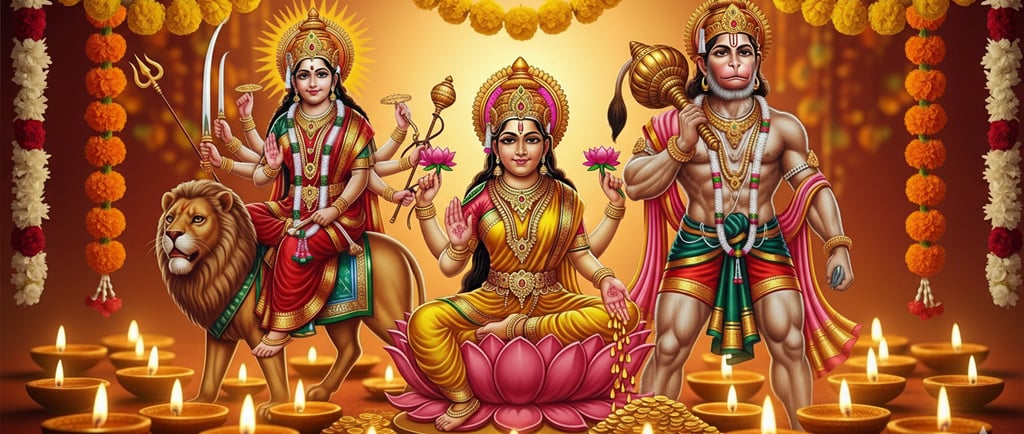What is the Significance of Dhanteras? Hindu Festivals Explained
Get answers to your spiritual questions. This guide explains Dhanteras, Pradosh Vrat, Sunderkand Paath, and more. All your answers in one place.
TEMPLE TRAVEL GUIDE
9/14/20253 min read


The Divine Calendar: A Guide to Key Hindu Festivals and Deities
Welcome to Ghar Pooja's guide to the sacred events that shape our spiritual lives. From the vibrant celebrations of Diwali to the deep devotion of Navratri, each festival and fast has a unique story and significance. Let's explore the divine calendar and understand the meaning behind these special days.
1. Festivals of Wealth & Light: Dhanteras and Basant Panchami
Dhanteras, the first day of Diwali, is a festival of wealth and prosperity. The name itself comes from "Dhan" (wealth) and "Teras" (the thirteenth day). It's a day when Hindus worship Goddess Lakshmi and Lord Kubera to attract good fortune. It's considered highly auspicious to buy gold, silver, or new utensils on this day.
Basant Panchami is the celebration of spring and new beginnings. This festival is dedicated to Goddess Saraswati, the deity of knowledge, art, and wisdom. Worshippers wear yellow, the color of prosperity and mustard flowers, to honor the goddess. It marks an excellent day to begin new studies or creative ventures.
2. The Powerful Navratri: Worshipping the Nine Forms of Durga
Navratri is a nine-night festival dedicated to the nine forms of Maa Durga. Each day, a different form of the goddess is worshipped.
Day 1: Maa Shailputri: The daughter of the mountains, Shailputri Mata is the first form of Durga. She represents the beginning of our spiritual journey. * Day 2: Maa Brahmacharini: Brahmacharini Mata represents penance and austerity. She is the unmarried form of Goddess Parvati, who performed intense penance to marry Lord Shiva.
Day 5: Skandamata: As the mother of Lord Skanda (Kartikeya), Skandamata represents the immense love of a mother. She is worshipped for peace and wisdom.
Day 8: Durga Ashtami: The eighth day of Navratri, Durga Ashtami, is one of the most significant days. It is believed that on this day, Maa Durga vanquished demons. It is also a day for Kanya Puja, where young girls are worshipped as manifestations of the goddess.
3. The Strength of the Divine Masculine
Hinduism also celebrates powerful male deities who protect and guide us.
Hanuman Jayanti: This festival celebrates the birth of Lord Hanuman, the epitome of strength, loyalty, and devotion to Lord Rama. Reciting the Sunderkand Paath on this day is believed to bring immense courage and remove obstacles.
Parshuram: The sixth avatar of Lord Vishnu, Lord Parshuram, is known for his warrior spirit and axe. He represents justice and the power to destroy evil.
4. Understanding Celestial Influences
Our scriptures place great importance on the influence of planets (grahas).
Shani Dev: Shani, or Saturn, is the god of justice who delivers the results of our karma. While his influence is often feared, he is also a great teacher who brings discipline and humility. Worshipping him on Saturdays helps in mitigating his negative effects.
Shukra: The planet Shukra (Venus) is the guru of the Asuras. He is associated with wealth, love, and material pleasures. Worshipping him can bring success and abundance.
5. Important Vrats and Rituals
Pradosh Vrat: This auspicious fast is dedicated to Lord Shiva and Goddess Parvati, observed on the thirteenth day of the lunar fortnight. Observing the Pradosh Vrat is believed to fulfill desires and grant salvation.
Chaturthi: This is the fourth day of a lunar fortnight and is dedicated to Lord Ganesha, the remover of obstacles. People observe a fast on this day to seek his blessings.
Ashtami: The eighth day of the lunar fortnight. Durga Ashtami and Krishna Janmashtami (celebrating Lord Krishna's birth) are both celebrated on an Ashtami tithi.
Frequently Asked Questions
What is the significance of the Sunderkand Paath? Reciting the Sunderkand Paath, which narrates Lord Hanuman's journey to Lanka, is believed to remove negative energy, increase courage, and bring peace and happiness into one's life.
Is Vashikaran a part of Hindu worship? While some traditional texts mention Vashikaran (mantras to control others), it is generally a controversial topic and not a part of mainstream Hindu worship or pooja rituals.
What is Ram Prashnavali? Ram Prashnavali is an ancient tool used to seek answers to life's questions. It is a spiritual practice where a user randomly selects a letter, which corresponds to a verse from the Ramayana, providing divine guidance.
